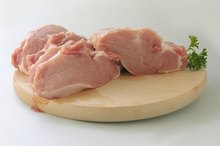What Happens if I Eat a Fatty Meal After Gallbladder Surgery?
Most people can live easily without a gallbladder if they need to have it removed due to recurrent gallstones or gallbladder disease 1. But you may find you no longer digest fats as easily following gallbladder removal surgery. That's because your gallbladder worked primarily to help you digest fats, and once you're without it, your body can't handle fatty meals as well. If you eat a fatty meal following gallbladder removal, you may experience some unpleasant gastrointestinal symptoms.
About the Gallbladder
Your body normally stores bile, a digestive enzyme, in your gallbladder. When your stomach senses you've eaten a fatty meal, it signals your gallbladder to release that bile, which your stomach needs to digest the fat. However, some people develop gallstones and inflammation in their gallbladder, which may get worse after a fatty meal. Some people ultimately may need to have their gallbladder removed to prevent infection and further gallbladder attacks, which can be intensely painful.
- Your body normally stores bile, a digestive enzyme, in your gallbladder.
- However, some people develop gallstones and inflammation in their gallbladder, which may get worse after a fatty meal.
Recommendations
Recommended Diet to Deal with Gallstones and Biliary Colic
Learn More
Immediately following your gallbladder surgery, your surgeon most likely will instruct you to stick to a bland diet that includes little spice or fat. This will last for a couple of days, after which you should switch to a low-fat diet. Because your gallbladder's main role was to help you digest fats, you'll need to give your body a chance to get used to living without it. This means avoiding foods such as fried chicken, french fries, fatty cuts of beef or pork and rich pastries and cakes.
- Immediately following your gallbladder surgery, your surgeon most likely will instruct you to stick to a bland diet that includes little spice or fat.
- Because your gallbladder's main role was to help you digest fats, you'll need to give your body a chance to get used to living without it.
Results
If you try to eat a fatty meal after gallbladder surgery, your body may not be able to digest it well 3. You may experience diarrhea, abdominal bloating and excess gas in the form of belching and/or flatulence. The diarrhea may be severe enough that you can't control it well. You may also find your stool for the next couple of days contains large amounts of fats; because your body couldn't digest the fat properly, it passes through your digestive tract, largely untouched.
- If you try to eat a fatty meal after gallbladder surgery, your body may not be able to digest it well 3.
- You may also find your stool for the next couple of days contains large amounts of fats; because your body couldn't digest the fat properly, it passes through your digestive tract, largely untouched.
Considerations
Diet for Gallbladder Sludge
Learn More
Most people eventually resume a normal diet following gallbladder surgery, and so you should be able to digest a fatty meal properly once your body has trained itself to live without your gallbladder. However, you have other reasons to maintain a diet lower in fat -- it may help you prevent heart disease and certain cancers, and it can help you lose weight if you're overweight or obese. If you can, limit your fat calories to no more than 30 percent of your overall calories, and reserve fatty meals as an occasional treat.
Related Articles
References
- Penn Medicine: Gallbladder Disease
- NHS.UK.gov: Do I Need To Change My Diet After Gallbladder Surgery?
- NetWellness.com: Diet After Having My Gallbladder Removed
- Cleveland Clinic. Gallbladder and biliary disease. Updated August 2010.
- MyHealth.Alberta.ca. Gallstones: Should I have gallbladder surgery? Updated November 7, 2018
- Cleveland Clinic. Gallbladder and biliary disease. Updated August 2010.
- American College of Surgeons. Cholecystectomy. Updated 2015.
- Cleveland Clinic. Bile duct exploration. Updated August 9, 2019.
- MyHealth.Alberta.ca. Gallstones: Should I have gallbladder surgery? Updated November 7, 2018
- Victoria State Government. Better Health Channel. Gallbladder-gallstones and surgery. Updated August, 2014.
- University of California San Francisco (UCSF). Choledochal cysts. Updated 2020.
- American Cancer Society. Surgery for gallbladder cancer. Updated July 12, 2019.
Writer Bio
J.M. Andrews has been a professional journalist for more than 20 years. She specializes in health and medical content for consumers and health professionals. Andrews' background in medicine and science has earned her credits in a wide range of online and print publications, including "Young Physicians" magazine.









